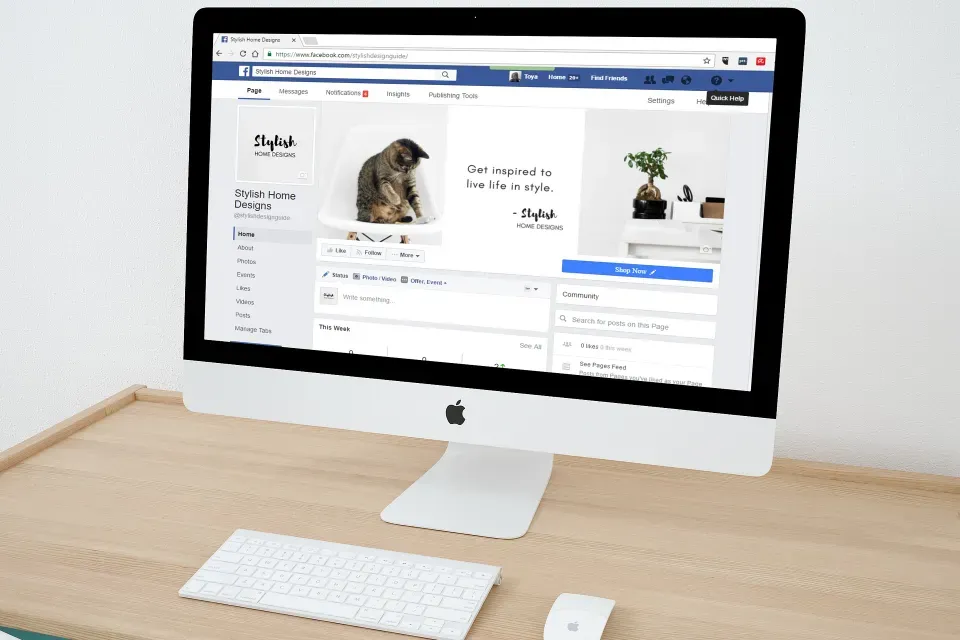
Unlock Success With a
Business Website,
Not Just Facebook
In the digital age, establishing a strong online presence is crucial for businesses. While many turn to social media platforms like Facebook, using a Facebook page as the sole representation of your business online can be a grave mistake. This article explores the top ten reasons why relying on a Facebook page as your primary website is ill-advised, offering alternative options for effective online business promotion.
1. It's not yours
The biggest drawback of using a Facebook page as your business website is the absence of ownership. Since the page belongs to Facebook, they retain control and can make changes or limit its visibility at any time. This lack of control can prove frustrating and potentially detrimental to your business, especially after investing considerable time and effort into building your Facebook presence.
2. Exclusion of Non-Facebook Users
While Facebook boasts billions of users, it's important to remember that not everyone utilizes the platform, particularly among younger and older demographics. By relying solely on a Facebook page, you risk alienating potential customers who do not engage with social media. To reach a wider audience, it's crucial to consider all available channels.
3. Limited SEO Potential
Search Engine Optimization (SEO) is essential for improving a website's search engine ranking. While it's possible to optimize a Facebook page to a certain extent, the platform imposes restrictions on keyword targeting and content posting.
Additionally, a website with multiple pages has a higher chance of appearing multiple times in search results, unlike a Facebook page. This makes it more challenging for potential customers to find your business online.
4. Ad Costs for Visibility
Facebook operates on a freemium model, offering free page creation and post updates. However, the organic reach of these posts is often limited. To expand your audience, paid advertisements have become necessary. While the cost may not be significant for some businesses, it's crucial to include ad expenses in your marketing budget.
5. Limited Functionality
A Facebook page provides basic functionalities such as posting updates and photos and using Facebook Messenger for communication. However, compared to a website, the features and capabilities are severely restricted. Websites offer opportunities to create forms, incorporate e-commerce functionality, and customize pages and posts with a broader range of formatting options.
6. Absence of a Sales Funnel
A website enables the creation of a sales funnel, guiding potential customers through a series of steps leading to a purchase. Calls-to-action, landing pages, and other tactics facilitate this process. In contrast, a Facebook page lacks the same level of control, hindering the ability to guide users effectively toward making a purchase.
7. Content Limitations
While an "About Us" section and updates can be posted on a Facebook page, there is no dedicated space for in-depth content that can attract users and improve search engine rankings. Websites offer the flexibility to create blog posts, articles, and other content types that engage and retain customers.
8. Inability to Brand Effectively
While a Facebook page allows for a cover image and profile picture, branding options are limited. Websites provide the freedom to choose color schemes, fonts, and design elements, allowing for a cohesive and professional brand representation.
9. Challenging Content Searchability
Websites offer efficient content organization, allowing pages and posts to be saved, organized, and easily searchable. Conversely, Facebook pages have limited options for content organization, with no export functionality. This makes it difficult for both businesses and customers to find and reference older posts.
10. Limited Analytics and Data
The analytics and data available on a Facebook page are not as comprehensive or customizable as those provided by a website. While Facebook does offer insights on post reach and engagement, website analytics provide more detailed information for tracking marketing efforts and making data-driven business decisions.
A Facebook page should complement a dedicated website, not serve as a substitute. To grow your business successfully online, it's imperative to have a professional website that enables brand promotion, showcases products/services, guides visitors through a sales funnel, and provides comprehensive analytics. While using a Facebook page may seem easier and cheaper, its limitations make it unsuitable for long-term success.
That's where Reputable Image comes in! We specialize in affordable, professional website development for businesses of all sizes. Our experienced designers and developers will collaborate with you to create a website that perfectly represents your brand and aligns with your business goals. After launching your website, leverage your Facebook page to promote and drive traffic to your site.
Don't settle for a limited online presence. Invest in a professional website and take your business to the next level. Fill out this form to ask for a fully responsive, mobile-optimized demo for FREE today!

